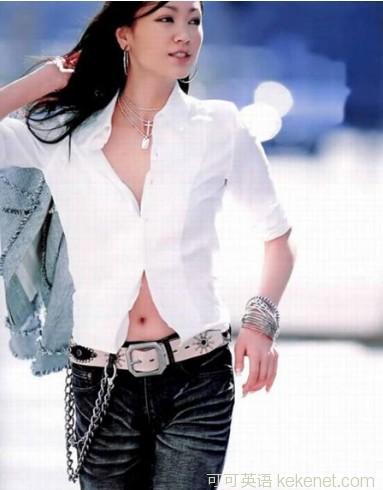
Business
商業(yè)
Physical attractiveness and careers
體貌魅力和事業(yè)
Don't hate me because I'm beautiful
美麗不是錯
Attractive women should not include a photo with a job application
魅力女性不應(yīng)在其申請表中添加照片
AT WORK, as in life, attractive women get a lot of the breaks.
工作場和生活中一樣,魅力女人總是占有優(yōu)勢。
Studies have shown that they are more likely to be promoted than their plain-Jane colleagues.
研究表明,她們總是比相貌平平的同事更容易獲得升職機會。
Because people tend to project positive traits onto them, such as sensitivity and poise, they may also be at an advantage in job interviews.
因為人們傾向于將正向的優(yōu)點投加到她們身上,比如敏感,鎮(zhèn)靜。漂亮女人在工作面試中也處于優(yōu)勢地位。
The only downside to hotness is having to fend off ghastly male colleagues; or so many people think.
熱辣魅力十足的唯一不足就是她們不得不試圖避開病態(tài)的的男同事;至少很多人這樣認(rèn)為。
But research by two Israelis suggests otherwise.
但兩位以色列學(xué)者的研究表明,情況恰恰相反。
Bradley Ruffle at Ben-Gurion University and Ze'ev Shtudiner at Ariel University Centre looked at what happens when job hunters include photos with their curricula vitae, as is the norm in much of Europe and Asia.
班古里昂大學(xué)的Bradley Ruffle和艾瑞爾撒馬利亞中心大學(xué)的Ze'ev Shtudiner研究了,在簡歷中添加照片的求職者的境遇,而添加照片在歐洲和亞洲都是慣例。
The pair sent fictional applications to over 2,500 real-life vacancies.
研究組給超過2500個職位空缺發(fā)送虛構(gòu)的申請。
For each job, they sent two very similar résumés, one with a photo, one without. Subjects had previously been graded for their attractiveness.
每個職位,研究員都發(fā)送了兩份相似的簡歷,一份有照片,一份沒有。而發(fā)送之前,會根據(jù)簡歷照片的漂亮程度打分。
For men, the results were as expected.
對男性來講,研究結(jié)果是意料之中的。
Hunks were more likely to be called for an interview if they included a photo.
富有魅力的健美男子如果添加照片則更容易進(jìn)入面試階段。
Ugly men were better off not including one.
丑男不添加照片則會有更好的結(jié)果。
However, for women this was reversed.
但是,對女性來說,結(jié)果恰恰相反的。
Attractive females were less likely to be offered an interview if they included a mugshot.
漂亮女人如果貼上靚照, 則更不容易進(jìn)入面試階段。
When applying directly to a company (rather than through an agency) an attractive woman would need to send out 11 CVs on average before getting an interview; an equally qualified plain one just seven.
在直接申請進(jìn)入公司(而不是通過中介)的情況中,漂亮女性平均需要遞送11份簡歷才得獲得機會面試,而姿色平平的女人只用遞送7份簡歷就可以了。
At first, Mr Ruffle considered what he calls the "dumb-blonde hypothesis"—that people assume beautiful women to be stupid.
首先,Ruffle考慮了他自己稱為"美女低智商假說"--人們認(rèn)為漂亮女人是愚蠢的。
However, the photos had also been rated on how intelligent people thought each subject looked; there was no correlation between perceived intellect and pulchritude.
但是,照片也對其看起來是否聰明進(jìn)行評分;發(fā)現(xiàn)在所謂的看起來的聰明和魅力之間并沒有聯(lián)系。
So the cause of the discrimination must lie elsewhere.
所以偏見的根源肯定來自于其他方面。
Human resources departments tend to be staffed mostly by women.
人力資源部主要由女性雇員組成。
Indeed, in the Israeli study, 93% of those tasked with selecting whom to invite for an interview were female.
事實上,在以色列的這項研究中,肩負(fù)挑選簡歷,確定申請人是否進(jìn)入面試階段工作的93%都是由女性擔(dān)任的。
The researchers' unavoidable-and unpalatable-conclusion is that old-fashioned jealousy led the women to discriminate against pretty candidates.
研究人員不得不得出一項令人不快的結(jié)論,那就是老套的嫉妒心使女性對漂亮的申請者產(chǎn)生偏見。
So should attractive women simply attach photos that make them look dowdy?
所以漂亮女士就應(yīng)該在簡歷里貼上自己的邋遢照片嗎?
No. Better, says Mr Ruffle, to discourage the practice of including a photo altogether.
不要。 Ruffle 認(rèn)為更好的辦法是不在簡歷中添加照片。
Companies might even consider the anonymous model used in the Belgian public sector, where CVs do not even include the candidate's name.
多家公司甚至認(rèn)為,比利時公共部門招聘采取的匿名模式更好,那就是在簡歷中甚至連名字都不寫。











